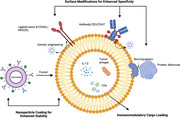- Record: found
- Abstract: found
- Article: found
Engineering exosomes to reshape the immune microenvironment in breast cancer: Molecular insights and therapeutic opportunities

Read this article at
Abstract
Background
Breast cancer remains a global health challenge, necessitating innovative therapeutic approaches. Immunomodulation and immunotherapy have emerged as promising strategies for breast cancer treatment. Engineered exosomes are the sort of exosomes modified with surface decoration and internal therapeutic molecules. Through suitable modifications, engineered exosomes exhibit the capability to overcome the limitations associated with traditional therapeutic approaches. This ability opens up novel avenues for the development of more effective, personalized, and minimally invasive interventions.
Main body
In this comprehensive review, we explore the molecular insights and therapeutic potential of engineered exosomes in breast cancer. We discuss the strategies employed for exosome engineering and delve into their molecular mechanisms in reshaping the immune microenvironment of breast cancer.
Abstract
Related collections
Most cited references110
- Record: found
- Abstract: found
- Article: not found
The biology, function, and biomedical applications of exosomes
- Record: found
- Abstract: found
- Article: not found
Biogenesis, secretion, and intercellular interactions of exosomes and other extracellular vesicles.
- Record: found
- Abstract: found
- Article: not found
